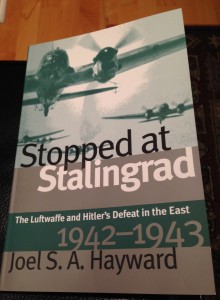Just about everyone has seen the movie based on this book, featuring Humphrey Bogart’s famous performance as Captain Queeg. The movie is indeed excellent–the book is even better, and contains a lot that is absent from the film. And while the film ends basically after the court-martial scene, the book continue to follow the USS Caine and key characters for the duration of the war. In this review, I won’t worry about spoilers re plot elements that were included in the movie, but will try to minimize them as far as other aspects of the book are concerned. After summarizing the story, I’ll comment on some of the issue raised by the book. (A recent article, referencing The Caine Mutiny, refers to Wouk as “the first neoconservative.”)
Lieutenant Commander Philip Queeg, a rigid and insecure man, is appointed during WWII to the command of Caine, a decrepit old destroyer-minesweeper…the ship and its slovenly-appearing crew are described as being part of the “hoodlum navy.” This is Queeg’s first command, and he is desperately concerned to make it a success, deeply afraid of making a mistake which will lead to his failure. Ironically, it is specifically this fear of failure and perceived need for perfection which is responsible for many, perhaps most, of his troubles. When Caine runs aground the first time Queeg takes her out, he fails to submit the required grounding report for fear of higher authority’s reaction. When the ship cuts her own towline while assigned to target-towing duty, Queeg cannot make up him mind whether or not to attempt recovery of the drifting target–and radios in for instructions. Incidents like these do not inspire confidence in Queeg on the part of his superiors.
The officers and crew of Caine also lose confidence in the captain as his obsessive-compulsive behavior becomes increasingly problematic. As a result of several incidents during combat, there are also concerns about Queeg’s personal courage. While no one aboard Caine likes Queeg once they get to know him, the captain’s most vocal critic is an officer named Thomas Keefer, an intellectual who is an aspiring novelist. Keefer has a cynical attitude toward the Navy, which he refers to as “a master plan designed by geniuses for execution by idiots,” and advises Willie Keith, a young officer who is his subordinate, that “If you’re not an idiot, but find yourself in the Navy, you can only operate well by pretending to be one.”
The ship’s executive officer is Steve Maryk. In civilian life a commercial fisherman, Maryk now hopes to make the Navy his career. Maryk is a fine seaman and a good leader, but not a highly-educated man–he is somewhat in awe of Tom Keefer’s intellectual attainments.
In repeated conversations, Keefer tells Maryk that the captain must be mentally ill, using psychological jargon and concepts that Maryk does not pretend to understand. Maryk is concerned enough about Queeg’s behavior that he begins keeping a “medical log” on Queeg, with the idea of presenting this to higher authority if necessary and possible. The time seems right when Caine shares an anchorage with the battleship carrying Admiral Halsey: Maryk takes his log, takes Keefer in tow, and heads over to the New Jersey to see if they can speak with the Admiral. But Keefer, at the last moment, chickens out, asserting that Halsey, with his experience aboard large well-managed ships, would never be able to understand the state of things aboard a hoodlum-navy ship like Caine, and that raising the issue with him would only get the two of them in trouble. Feeling unable to make the case without support, Maryk gives up on talking to Halsey and the two officers return to Caine.
But soon thereafter, the old ship encounters a typhooon. Fleet course is 180 degrees, due south–away from the wind–and Queeg refuses to adopt the safer course of heading into the wind even though communication with other ships, as well as radar contact, has been lost.
An unbelievably big gray wave loomed on the port side, high over the bridge. It came smashing down. Water spouted into the wheelhouse from the open wing, flooding to Willie’s knees. The water felt surprisingly warm and sticky, like blood. “Sir, we’re shipping water on the goddamn bridge!” said Maryk shrilly. “We’ve got to come around into the wind!”
“Heading 245, sir.” Stilwell’s voice was sobbing. “She ain’t answering to the engines at all, sir!”
The Caine rolled almost completely over on its port side. Everybody in the wheelhouse except Stilwell went sliding across the streaming deck and piled up against the windows. The sea was under their noses, dashing up against the glass. “Mr Maryk, the light on this gyro just went out!” screamed Stilwell, clinging desperately to the wheel. The wind howled and shrieked in Willie’s ears. He lay on his face on the deck, tumbling around in salt water, flailing for a grip at something solid.

